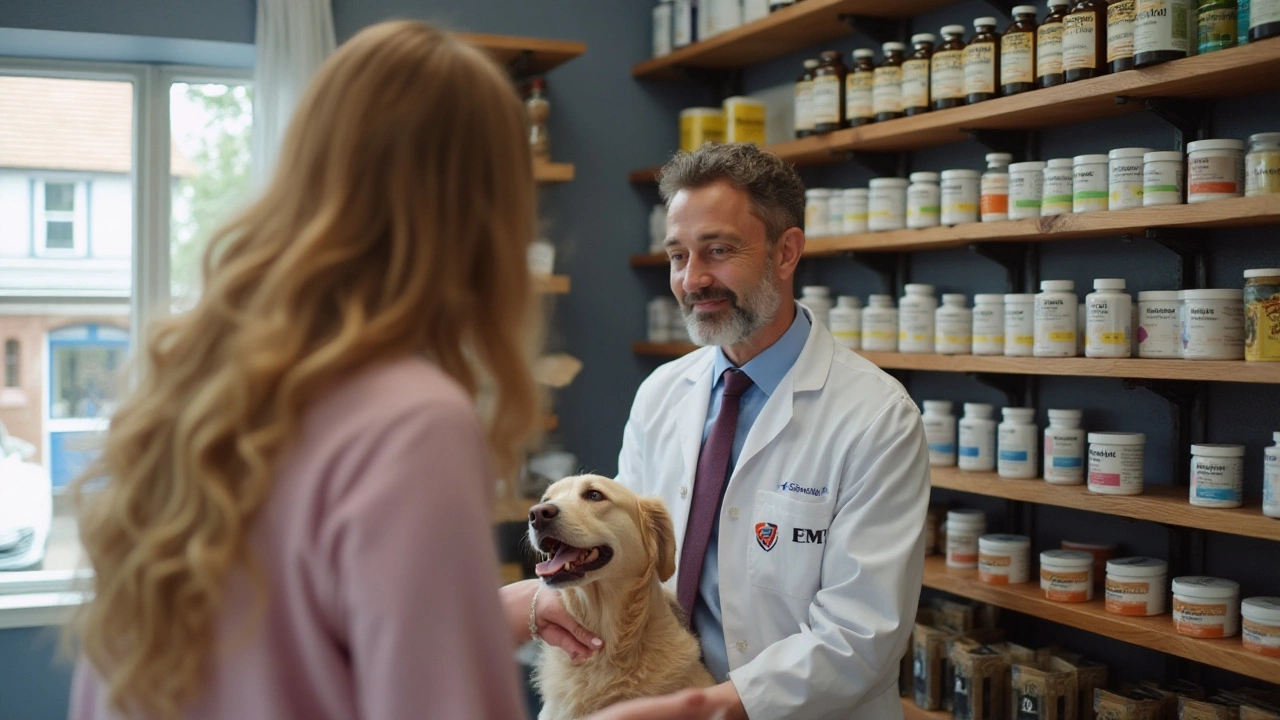Ensuring that your dog receives a balanced diet is essential for their long-term health and happiness. While commercial dog food can meet basic nutritional needs, supplementing with additional nutrients can address specific health concerns, enhance vitality, and improve their quality of life.
In this article, we delve into various supplements that you can add to your dog's food each day to boost their overall wellness. We'll explore the health benefits of omega-3 fatty acids, which play a critical role in maintaining healthy joints and skin, and probiotics that promote better digestion.
Additionally, we'll provide insights into antioxidants that help reduce inflammation and glucosamine's importance for joint health. By the end of this read, you'll have a comprehensive understanding of how these supplements can contribute to your furry friend's diet in a beneficial way.
- Understanding Canine Nutrition
- Benefits of Omega-3 Fatty Acids
- Probiotics for Digestive Health
- The Role of Antioxidants
- Incorporating Glucosamine for Joint Support
- Tips for Safely Adding Supplements
Understanding Canine Nutrition
When it comes to keeping our loyal companions healthy and energetic, understanding the intricacies of canine nutrition is crucial. Dogs, like humans, require a balanced diet full of essential nutrients to thrive. However, knowing what constitutes that balance can be a bit complex. At the heart of every dog's diet should be a proper mix of proteins, fats, carbohydrates, vitamins, and minerals. Each of these elements plays a vital role in your dog's overall health, influencing everything from their coat's shine to their energy levels.
Proteins, found in high-quality meats, are the building blocks for tissue repair and muscle growth. It isn't just about giving any protein-rich food; it's about choosing the right kind that provides all essential amino acids required by dogs' bodies. Similarly, dietary fats are a significant source of energy and play a foundational role in nutrient absorption. Incorporating omega-3 fatty acids, for instance, not only supports joint and skin health but also enhances brain function and vision. Including healthy fats in their regular meals can make a big difference in their life.
Carbohydrates often spark debate among pet owners, but they can be valuable when sourced from whole grains and vegetables. They supply dogs with necessary energy and aid in digestion due to their fiber content. While you should limit their intake, they should not be ignored completely. Vitamin and mineral intake is just as important, providing critical roles in bodily functions ranging from immune defense to bone development. Calcium and phosphorus, for example, are essential for strong bones and teeth, while zinc contributes greatly to skin health. A balanced blend is indispensable, thus recognizing needs through research or consultation can be beneficial.
"Nutritional needs of dogs can vary based on various factors, such as breed, age, and activity level," says Dr. Animalia, a renowned veterinary nutritionist, which highlights the importance of personalized nutrition planning.As every breed has its own distinctive requirements and traits, tailoring their diet to those specific needs is often a smart path. For growing puppies, adult dogs, and seniors, nutritional requirements will contrast, demanding different proportions of nutrients. Working and highly active breeds might need extra proteins and calories, while less active breeds may benefit from a diet lower in calories and fat. It's essential to stay vigilant to their body's reactions and adapt hunting for suitable solutions accordingly.
Beyond merely serving meals, monitoring portion sizes, adjusting food types, and even preparing homemade meals with the guidance of vets can serve well. There’s a striking statistic - over 50% of dogs are overweight, which reflects the essential role a balanced diet and exercise play in preventing obesity. Understanding and adapting the feline guidelines to meet specific demands thus denote caring, which amps up well-being and extends their life span. Making informed decisions when feeding beloved pets will not only nourish them adequately but also cater sustainable happiness through energized years.
Benefits of Omega-3 Fatty Acids
Incorporating omega-3 fatty acids into your dog's diet can bring a plethora of health benefits that significantly enhance their quality of life. These crucial nutrients, commonly found in fish oil and flaxseed, have been shown to support everything from reducing inflammation to boosting heart health. Omega-3s are renowned for their powerful anti-inflammatory properties, which can help alleviate symptoms of arthritis, making it easier for older dogs or those with joint issues to move comfortably.
One of the standout benefits of omega-3s is their impact on skin and coat health. These fatty acids help maintain a glossy, healthy coat and alleviate skin conditions like dermatitis. The anti-inflammatory properties work wonders on itchy skin and allergies, giving your dog much-needed relief. Equally important is their role in cognitive function. Studies suggest that puppies fed with DHA, a type of omega-3, show improved neurological development. For older dogs, omega-3s may help slow cognitive decline, keeping them sharp and active.
The cardiovascular benefits of omega-3s cannot be overstated. These fatty acids are known to lower triglyceride levels and help manage heart disease. In fact, research indicates that omega-3 supplements can reduce the risk of atrial fibrillation, ensuring that your dog’s heart beats strong and steady. Moreover, some veterinarians suggest that omega-3s bolster immune function, aiding dogs in warding off infections and illnesses more effectively.
"Omega-3 fatty acids are nature’s powerhouse for both humans and pets," says Dr. Karen Becker, a holistic veterinarian. "Including them in your dog's diet can have remarkable effects on their overall health."
Administering omega-3s can be straightforward. It usually comes in liquid form or as capsules that can be easily mixed into your dog’s food. When choosing an omega-3 supplement, it's vital to ensure it's high-quality and devoid of harmful contaminants. Proper dosage is crucial too, as too much can lead to side effects like diarrhea. Typically, the amount will vary based on your dog’s size and individual health needs, so consulting with your vet is a wise move.
Due to their many benefits, omega-3 fatty acids have become a staple in many dog owners’ nutrition toolkit. By ensuring these powerful nutrients are part of your pet's daily diet, you're taking a proactive approach to their health, giving them a happier, longer life.

Probiotics for Digestive Health
When it comes to promoting vibrant digestive health in dogs, probiotics stand out as an invaluable addition to their daily diet. These beneficial bacteria are known for their ability to keep your dog’s gut flora balanced, which is crucial given that a significant portion of the immune system is housed within the digestive tract. A well-maintained gut microbiome can fend off harmful bacteria while fostering nutrient absorption, contributing fundamentally to your dog’s well-being. Specifically, they help mitigate gastrointestinal issues like diarrhea, constipation, and bloating, which can disrupt your pet's life and be worrisome for any dog owner.
Integrating probiotics into your dog's regimen couldn't be simpler and can dramatically enhance their quality of life. Notably, scientific exploration continues to unveil new strains, and varied benefits. Lactobacillus and Bifidobacterium are among the most popular strains, capitalized on for their ability to fight off pathogens and promote a strong intestinal lining. Often found in yogurt and fermented vegetables, probiotics for dogs are also available in easily administered powder or capsule forms, tailored specifically for their unique digestive systems.
According to a study published in the Journal of Veterinary Internal Medicine, probiotics can be particularly effective in managing acute cases of diarrhea related to stress or antibiotics, highlighting their versatility.Understanding these benefits can guide you in leveraging probiotics to keep your dog’s digestion seamless and uncomplicated, thus ensuring they stay active and joyful.
The broader health implications of supporting your pet's digestion with probiotics are profound, impacting much more than just their stomach. A healthy gut means fewer toxins and allergens making their way into the bloodstream, which can translate into improvements in skin health and reductions in allergy symptoms — a known benefit to many who incorporate dog nutrition-focused supplements such as probiotics into meals. As we become more informed about the profound connections between gut health and overall wellness, the role of probiotics becomes increasingly significant. Imagine having a dog with softer fur, less itching, and a shiny coat as a visual testament to what a balanced gut can do. It’s better for them, and of course, it's wonderful for you as their caregiver to see them at their best.
The Role of Antioxidants
Antioxidants are vital components in maintaining your dog's health, acting as nature's little protectors against harmful free radicals in the body. These molecules work diligently to neutralize free radicals, which are unstable atoms that can cause oxidative stress and lead to cell damage. Oxidative stress has been linked to various chronic diseases, including cancer and heart disease, making antioxidants crucial in your dog's daily diet. Many everyday fruits and vegetables, like blueberries, carrots, and spinach, are rich sources of antioxidants and can be incorporated into their meals for an extra health boost.
One fascinating fact about these powerful nutrients is how they contribute to your dog's immune system. Strong immunity is crucial, particularly for active dogs that are frequently exposed to the external environment. Antioxidants help in reducing inflammation, which can occur after exercise or during times of stress, and they play a role in repairing the body by minimizing cellular damage. This makes them an integral part of a strong and healthy lifestyle for your canine companion. According to Dr. Deborah Linder, a renowned veterinary nutritionist, "Including antioxidant-rich foods in your pet's diet is more than just a trend; it's an investment in their long-term health."
"Including antioxidant-rich foods in your pet's diet is more than just a trend; it's an investment in their long-term health." - Dr. Deborah Linder, Veterinary Nutritionist
Incorporating antioxidants doesn't stop at fruits and vegetables. Certain supplements are also designed to provide a concentrated dose of these protective nutrients. These supplements are especially beneficial for older dogs, who might suffer from neurodegenerative diseases due to aging. The antioxidants help in promoting brain health and could potentially slow down the progression of cognitive dysfunction. Providing antioxidants in both natural and supplement form ensures comprehensive support to keep your dog's brain and body young and vibrant.
Choosing the right antioxidants for your dog involves understanding their specific needs and health conditions. For instance, dogs with skin allergies could benefit significantly from antioxidants due to their anti-inflammatory properties, helping reduce flare-ups and irritation. Those with joint issues might see improvements too, as antioxidants can alleviate inflammation in the joints. It’s essential, however, to consult with your veterinarian before introducing new supplements to ensure they align with your dog's health strategy and do not interfere with any existing medications.
To maximize the benefits of antioxidants, it is important to provide a balanced mix of nutrients. Combining different sources of antioxidants allows for a broader spectrum of health benefits and might offer more robust protection against free radicals. Along with a balanced diet, adequate exercise and a stress-free environment also contribute significantly to reducing oxidative stress and supporting your dog's overall health.

Incorporating Glucosamine for Joint Support
Glucosamine, a naturally occurring compound, is an essential building block for maintaining healthy cartilage in dogs. Especially as dogs age, the wear and tear on their joints can lead to conditions such as arthritis, making glucosamine a vital supplement. Adding glucosamine to your dog's diet can potentially slow down the degradation of cartilage, helping your pet stay active and playful for longer. Understanding how and when to incorporate glucosamine can make a big difference in your dog’s comfort and mobility.
For young and old dogs alike, joint health is crucial. Pups with highly active lifestyles and those of certain breeds predisposed to joint issues, like Labradors and German Shepherds, can greatly benefit from early supplementation. Glucosamine is often paired with chondroitin, another compound that supports joint health by enhancing the elasticity and resistance of cartilage. These compounds not only help in rebuilding lost cartilage but can also reduce painful inflammation, making quality of life much better for your furry friend. Dog nutrition experts suggest starting supplementation in the early years for predisposed breeds to delay or prevent joint problems later in life.
Consulting a veterinarian before beginning any supplement routine is key. Not every dog requires the same dosage, and factors such as size, weight, and existing health conditions should always be taken into account. The market today offers a wide variety of glucosamine supplements, ranging from tasty chews to powders you can mix with your dog's food. It's about finding the form that best fits your dog's preference while respecting the recommended dosages. Always remember, like any supplement, quality comes first. Opt for reputable brands known for their stringent sourcing and manufacturing practices.
Peggy Wilson, a renowned vet with decades of experience, states, "Joint support supplements like glucosamine are similar to an insurance plan for your dog's mobility. Starting such a regimen with the guidance of your vet can lead to a more active and happy life for many senior dogs."
The efficacy of glucosamine, though often praised, can vary per dog. Some pet owners notice significant improvement in their dog’s mobility and less pain within a few weeks, while others may see slow progress or need to adjust dosing after some time. It's about patience and observation. Look for changes in your dog's activity levels, and monitor their comfort in daily movements. Remember, every dog is different, and so is their response to supplements. A balanced approach, coupled with a healthy diet and regular exercise, is fundamental to maintain the benefits of glucosamine in your dog’s diet.
Tips for Safely Adding Supplements
Adding supplements to your dog's diet can be incredibly beneficial, but it requires a careful approach to ensure your furry friend's safety and health. Incorrect dosages or unsuitable supplements can lead to unforeseen health issues, which is why it's vital to do your due diligence before introducing new elements into their diet. Begin by consulting with your veterinarian. They can provide tailored advice based on your dog's specific health needs, age, weight, and any existing medical conditions. This step is indispensable in making well-informed decisions that will positively impact your pet's life rather than inadvertently causing harm. Be aware of your dog's behavior and physical condition, as these can guide your choices in what supplements may be necessary.
There's a wide range of supplements out there, from omega-3 fatty acids to probiotics and glucosamine. While these have known benefits for maintaining joint health, improving digestion, and supporting overall vitality, they must be introduced gradually into your dog's food. Start with a low dosage and progressively increase it to the recommended amount. This helps their body adjust and can prevent any adverse reactions that might occur with a sudden change. Alongside, keep an eye out for any changes in appetite, energy levels, or stool consistency, as these could indicate how well your pup is adapting to the new addition.
It's also essential to read labels and choose high-quality products designed specifically for dogs. Human supplements might not be appropriate due to differing body processes or dosage requirements. Opt for products that have been tested and approved by relevant authorities, ensuring credibility and safety. Recommendations from pet nutritionists can further guide you in selecting supplements that have been proved effective through scientific research. Mary Geary, a veterinary nutritionist, once said,
"The right supplement can act as the missing puzzle piece to your dog's nutritional needs, bringing completeness to what they gain from daily food."This highlights the transformative role supplements can play when chosen wisely.
When it comes to tracking the efficacy of the supplements, patience is key. Changes might not be immediate, so give your dog time to show improvements over weeks or even months. Establish a tracking journal where you can note down any observable changes in their coat shine, mobility, or overall demeanor. This not only helps in monitoring progress but also provides valuable information during veterinary consultations. These insights can be crucial for adjusting dosages or even trying alternate supplements if the current ones are not yielding desired results.
In addition, some dogs might have allergies or intolerances to certain ingredients found in supplements. To mitigate risks, you might consider having allergy testing done, especially if your dog has a history of sensitivities. The ingredient lists provide a good starting point; look for supplements free from common allergens such as dairy, soy, and wheat, unless you know your dog can tolerate these well. Dog nutrition is a pivotal part of their health regime, and being vigilant about what goes into their bowls is part of responsible pet ownership.
Lastly, simplicity is a golden rule when it comes to introducing new health supplements into a canine diet. Rather than overwhelm your dog’s system with multiple new supplements at once, introduce them one at a time to accurately judge their benefits or potential side effects. Keeping a simplicity-centered approach ensures that each supplement can perform its specific health roles effectively without interference from other new elements just added to the diet. In this way, not only will you protect your pet’s well-being, but you'll also pave the path for a healthier, more bountiful life ahead.
